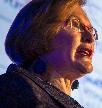The success of a political leader depends on many things. Some within your control, others not.
It is important to understand the difference.
Political leadership is like swimming in the sea, at the spot where the signs on the beach warn against cross-currents, and a huge backwash. If you are brave or rash enough to go into the water, you have to negotiate the turbulence to prevent yourself from drowning.
Sometimes the current works with you. Sometimes it pulls you way off course. Many politicians perish in the process.
When I was leader of the DA, there were many powerful currents working against us -- but at least I could rely on a strong supportive swell that helped us achieve our core objective: growing the party’s support.
The wave that I was able to ride, was “the Zeitgeist”. Between 2007 and 2015 (when I was DA leader) the spirit of the times was propelling political growth towards the moderate, non-racial, inclusive centre of the political spectrum.
That is where we, in the DA, positioned ourselves, and (despite all the currents working against us) we were able to ride that swell with considerable success.
Now, just six years later, that wave has broken, and turned into a vicious backwash.
The Zeitgeist is fracturing the moderate, non-racial, inclusive centre of politics. The currents are now pushing people apart, polarising around race and identity.
This is demonstrated world-wide, in the “Culture Wars” of the United States (eroding the Melting-Pot myth), the Brexit movement in the UK, and the backlash against “multi-culturalism” in Europe.
All these influences have had a profound impact on our political discourse, heightened many fold by the power of social media.
It has come at the worst possible time for South Africa, as we try to overcome the divisions of the past. Now, it has become fashionable, even “progressive,” to define and judge people on the basis of their race, and other biological markers, rather than the content of their character.
Worst of all, instead of focussing our attention on sustainable solutions to the real causes of our crisis -- 42% unemployment and growing -- many South Africans are following the siren call of the Zeitgeist to blame “whites and whiteness” for our problems -- a fatal diversion if ever there was one.
Of course, this racial narrative has had one inevitable result -- a backlash amongst minorities -- who are also polarising into identity enclaves, in contrast to the expansive commitment to a common nationhood of a decade ago.
In short, South Africa’s founding vision, articulated by Nelson Mandela (that we could achieve a common, non-racial nationhood, focussing on clear policy choices to improve our society for all) lies in tatters. It has been the first casualty of the changing Zeitgeist.
Although this has made things far more difficult for parties of the moderate non-racial centre, such as the DA, we cannot contemplate giving up. Quite the contrary. It is a signal for us to re-double our efforts, to swim against the prevailing Zeitgeist backwash, even if we hit the rocks, in the knowledge that the tide will eventually turn again.
Until it does we have to keep our heads above water, drawing on all our inner resources to keep on swimming. In political terms it means demonstrating in practice where we govern, that South Africans will have to learn to live together as brothers, or perish together as fools. As hard as it is, we will have to reclaim our captured democratic institutions and make them work.
We will have to have honest, grown-up conversations that do not avoid the hard truths that need to be told, because some people are considered too fragile to hear them. Such as the role played by “culture” in our politics.
As hard as it is, and for as long as it takes, we need to forge a society in which people will vote on the issues, not on their identity. It is much harder to do this when the current is dragging us into the political vortex of race and ethnic identity.
But there really is no viable, sustainable alternative.
As our founding leader, Jannie Steytler, so crisply put it: One day, South Africa will be governed by our principles, because it is the only way it can be governed. That remains as true today, as it was in the 1960s.
Source: www.facebook.com/helenzille

